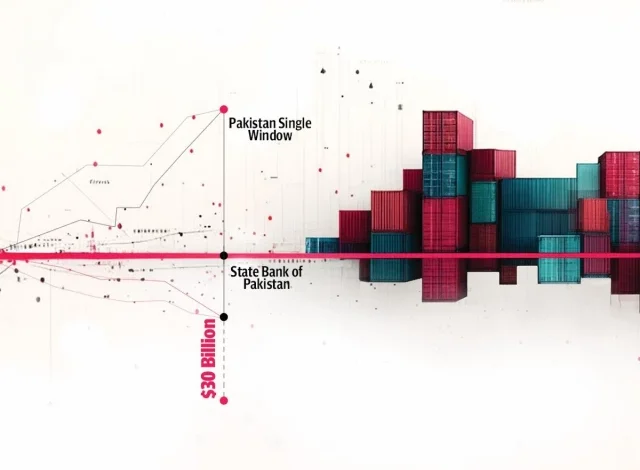$30 billion gap in import documents

The urgent need to reconcile the significant disparity is highlighted by the fact that the federal government booked $321 billion in imports during the last five years, which is $30 billion more than the import payments that the central bank cleared through banking channels during the same period.
From July 2020 to June 2025, the State Bank of Pakistan (SBP) cleared $291 billion through banks, while the Pakistan Single Window (PSW) booked imports totaling $321 billion, according to official statistics.
Since the Pakistan Bureau of Statistics (PBS) has been publishing monthly trade bulletins based on data from the Pakistan Revenue Automation Limited (PRAL), the PSW figures have not been released previously.
The central bank only keeps track of the cost of commodities; freight and insurance costs are handled differently, which contributes to the significant discrepancy between SBP and PSW figures. According to official sources, the size of the disparity indicates that the import value differential is still abnormally high even once freight is taken into consideration.
Last Monday, the Express Tribune revealed that PRAL’s import figures for fiscal years 2023–2024 and 2024–2025 were $11 billion less than PSW’s.
The central bank explained after the news that “the SBP’s trade data is computed mainly based on trade payments data received from banks; hence, there will be no significant revision in current account balance data already published by the SBP.” However, the central bank pointed out that, in accordance with standard procedure, some changes might still be made.
The report contrasted SBP data with imports scheduled by PSWs.
In order to address the disparity and ascertain the actual source of funds for imports reported by PSW, government stakeholders told The Express Tribune that every banking and import transaction during the last five years needed to be examined. Imports from PSW are substantially more than those PRAL and the SBP indicate.
According to official statistics, PRAL recorded $16.5 billion less in imports during the same period, which ran from July 2020 to June 2025, than PSW figures.
The International Monetary Fund (IMF) requested last week that Pakistan make trade data inconsistencies totaling billions of dollars publicly available. In order to avoid misunderstanding between the government and data users, the IMF suggested during negotiations implementing a clear communication policy to clarify these differences and methodological adjustments.
According to reports, Pakistan acknowledged to the IMF that some import amounts were missing from the trade data that PBS sent to the Geneva-based International Trade Centre (ITC). Officials insisted, however, that the underreporting resulted from switching the trade data source from PRAL to PSW and was not the result of malicious intent.
While PSW is a separate legal body, the majority of its personnel are from the Customs Department, whereas PRAL is governed by the Federal Board of Revenue (FBR). “During internal scrutiny, the discrepancies initially appeared minor but have grown significantly in recent years,” the FBR representative told the IMF.
PRAL data had been used by the PBS to report import figures.
Before being included in the statistics system, PBS told the IMF that trade data analysis would be conducted with the cooperation of all parties involved and reported to the appropriate venues. According to sources, the IMF team said that stakeholders should try to update and provide the Fund with data from prior years.
All import entries, especially those pertaining to trade facilitation schemes, are covered by the PSW data, which is thought to be more thorough.
According to sources, importers may have abused export finance capabilities to avoid paying taxes and made payments outside of the banking system. Raw materials could have been utilized to make things that were then marketed locally, they noted.
An endeavor to reconcile trade data disparities between Chinese exporters and Pakistani buyers revealed the underreporting. A committee has been established by Prime Minister Shehbaz Sharif to look into the matter.
Officials from the FBR, PBS, PRAL, and PSW collaborated to analyze five years’ worth of trade data. It was discovered that a programmed query that had not been changed since 2017 was used to retrieve PBS’s trade statistics, resulting in a consistent underreporting of imports that has gotten worse in recent years. There was a $5 billion discrepancy between PSW’s $64.1 billion in import bookings and SBP’s $59.1 billion in fiscal year 2024–2025. The discrepancy between PSW’s $60 billion and SBP’s $53.2 billion imports in 2023–2024 was $6.7 billion.
According to the sources, the significant differences between SBP and PSW figures show that freight payments alone cannot account for the discrepancy.
In 2021–2022, the SBP’s import total was $10.8 billion less than PSW’s, the largest one-year difference. In that year, imports were $82.3 billion for PSW, $80.2 billion for PRAL, and just $71.5 billion for SBP.
PSW booked $57 billion in imports in 2022–2023, but the SBP booked $52.7 billion, a $4.3 billion difference. PSW reported $57.8 billion in 2020–21, whereas SBP reported $54.3 billion, a $3.4 billion discrepancy.